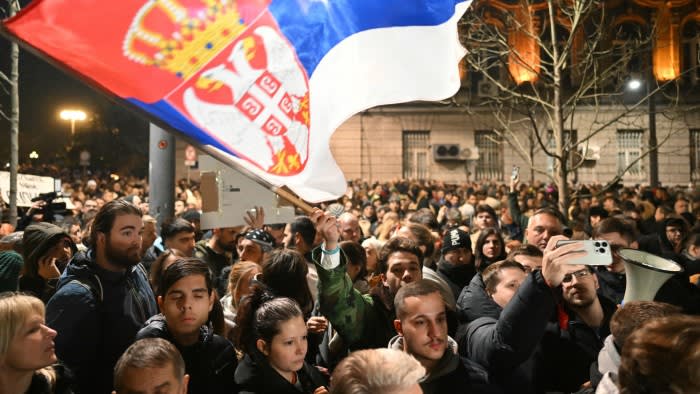EU demands Serbia reforms after reports of election fraud

Unlock the Editor’s Digest for free
Roula Khalaf, Editor of the FT, selects her favourite stories in this weekly newsletter.
The EU has told the Serbian government to tighten up its election procedures or risk jeopardising its talks to join the bloc after the ruling party won parliamentary and local ballots on Sunday amid widespread reports of vote-rigging.
International observers denounced the conduct of the elections, in which the SNS party of President Aleksandar Vučić secured an outright majority in parliament and held on to the post of Belgrade mayor.
Tens of thousands of Serbs took to the streets of the capital on Monday to protest against voter fraud and more demonstrations are planned.
Vučić’s party was accused of busing unregistered voters on a massive scale into Belgrade from Serb areas of neighbouring Bosnia and of harassing opposition supporters.
European commissioners Josep Borrell and Olivér Várhelyi demanded that “credible reports of irregularities are followed up in a transparent manner” by the Serbian authorities.
“We conclude with concern that the electoral process requires tangible improvement and further reform, as the proper functioning of Serbia’s democratic institutions is at the core of Serbia’s EU accession process.”
The SNS party said reports of voter fraud were “fake news”.
“We are very happy how the election day went,” Miloš Vučević, SNS party leader, said on pro-government TV channel Prva on Tuesday. “It can set an example for many other countries.”
However, election observers for the Organisation for Security and Co-operation in Europe (OSCE) also identified widespread irregularities and concluded that the elections at the weekend were held amid “unjust conditions”.
The Parliamentary Assembly of the Council of Europe (Pace), which also took part in election monitoring, said the volume and seriousness of the complaints discredited the entire election.
“This was a stolen victory . . . and unfair result,” Pace mission chief Stefan Schennach told the FT. “[Vučić] is supposed to be neutral but was the whole engine of this campaign . . . The pressure was well organised. One of our teams had a car following them all the time.”
Schennach recounted a story that he said showed people were illegally registered to vote in areas where they were not resident.
“A lady came to a polling station in Belgrade, holding around 15 white slips that had been posted through her apartment door, apparently all people that lived in her flat,” he said. “All of them had been to the polling station earlier that day and voted already. It was unbelievable.”
Opposition supporters say the governing party brought as many as 40,000 pretend residents — many of them from Bosnia — to the Belgrade Arena, a sporting venue, from where they were dispatched to voting precincts across the capital.
Stefan Jančić, a lawyer, said he witnessed the busing-in process after passing through a security control at the arena.
“A security guard at the arena told us to show them ID and they will get us into vans and cars and they will drive us to where we have to vote,” Jančić told the FT. “There are different stands in the arena which tell you which municipalities you have to go to.”
“On the way in we met a family from Rogatica, [Bosnia] who had never visited Belgrade in their life . . . They received a Belgrade ID last month and didn’t know where to go.”
Opposition supporters said the votes brought in would have been enough to secure victory for the incumbent Belgrade mayor, Aleksander Šapić.
“This is illegal . . . Belgrade elections were rigged,” said opposition politician and former deputy speaker Borko Stefanović, from the Freedom and Justice party, part of the main opposition Serbia Against Violence coalition.
Stefanović said opposition protesters had barricaded themselves inside the offices of the electoral commission and would remain there until the Belgrade elections were “annulled and new ones held”.
He said international monitoring reports were largely ineffectual as the government could ignore them at no cost.
“The OSCE reports are a piece of paper that nobody pays attention to,” he said. “For Vučić it’s just a box he has to tick but there’s no change in his autocratic behaviour. The threat of being denied access to the EU path means nothing, he doesn’t care about the EU path.”
The democracy watchdog CRTA, which sent election monitoring teams nationwide, also said it had reasons to dispute the election results.
“Considering the scope and diversity of electoral abuses . . . the results of the Belgrade elections do not reflect the freely expressed will of voters,” the watchdog said in a statement.
Irregularities that directly compromised election results had been recorded at one in 20 polling stations in parliamentary elections and nearly one in 10 polling stations in Belgrade, it added.
This article has been archived for your research. The original version from Financial Times can be found here.

